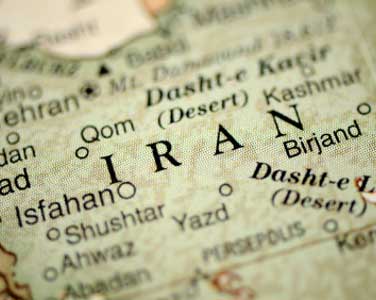A pastor in Iran found guilty of leaving Islam awaits the outcome of a judicial investigation into his spiritual background to see if he will be executed or, if possible, forced to become a Muslim, according to Christian groups with ties in Iran.
The court-ordered investigation will take place this fall to determine whether Pastor Youcef Nadarkhani, 34, was a Muslim as a teenager before he became a Christian at 19.
On Sept. 22, a regional court sentenced Nadarkhani, who leads a 400-strong house church movement in Rasht, to death by hanging for “convert(ing) to Christianity” and “encourag(ing) other Muslims to convert to Christianity.” Nadarkhani’s lawyer appealed the verdict to the Iranian Supreme Court, in part because the pastor said he had never actually been a Muslim and therefore could not be found guilty of abandoning the religion.
The court issued a written response to the appeal on June 12, upholding the death penalty but ordering the investigation.
The response to the appeal, which took a month to reach Christian and human rights groups outside of Iran, reads in part: “According to Part 2 of Article 265 of the Islamic Republic Criminal Law, this case was received by and must be returned to the state court of Gilan Section 11, and further investigated to prove that from puberty (15 years) to 19 he was not Muslim by his acquaintances, relatives, local elders and Muslims he frequented. He must repent [of] his Christian faith if this is the case. No research has been done to prove this; if it can be proved that he was a practicing Muslim as an adult and has not repented, the execution will be carried out.”
Even if the investigation releases him from the charge of apostasy, it is likely the charge of evangelizing Muslims will still carry a lengthy prison sentence, sources said.
The charges against Nadarkhani stem from a complaint he made to local officials over a government decision to teach Islam to all children at school, regardless of their respective religions. He was called to appear before a tribunal on Oct. 12, 2009 and arrested the same day. He has been held in government custody since then.
Advocates familiar with Nadarkhani’s case said conditions of his imprisonment have varied from solitary confinement to being allowed visits from family members and his attorney. Jason DeMars, president of Present Truth Ministries, a group that works with Christians in Iran, said officials have repeatedly used pressure tactics to force Nadarkhani to become a Muslim, including threats to seize his children and arresting his wife on apostasy charges. On June 18, 2010, officials found Fatemah Pasindedih guilty of the charges, but her conviction was stricken on appeal, and she was released in October.
Nadarkhani has had run-ins with Iranian officials before. In December 2006, he was arrested on other apostasy-related charges and held for two weeks. Officials have targeted Nadarkhani, DeMars said, because he leads a house church movement.
Investigation
It is unclear how officials will conduct the investigation into Nadarkhani’s spiritual beliefs of almost 20 years ago, but they will not be able to question his parents, both deceased.
There is no Iranian criminal statute requiring the execution of those who abandon Islam. In September 2008 members of the Iranian parliament began writing a law instituting the death penalty for men, and life imprisonment for women, who leave Islam. According to the 2011 annual report issued by the U. S. Commission on International Religious Freedom (USCIRF), “If the proposed law is passed, it would further endanger the lives of all converts from Islam.”
According to DeMars, the judges who issued the ruling appear to be relying on at least one fatwa, or religious edict, written by the Grand Ayatollah Ruhollah Khomeini, leader of the 1979 Iranian Revolution, and on edicts issued by Grand Ayatollah Naser Makarem Shirazi, a current religious leader in Iran. The edicts are based upon Shiite interpretations of the Quran and Hadith, a written record of the sayings and actions of Muhammad.
The last person to be executed for “apostasy” in Iran was Hossein Soodmand, who was hanged on Dec. 3, 1990. Soodmand’s case has parallels with Nadarkhani’s. Soodmand was also a pastor, and he also became a Christian as a teenager. Soodmand however, believed in the Islamic religion as a child.
Crackdown
Iran has a well-established history of persecuting religious minority and dissident groups. Last year the government started another in a series of crackdowns on evangelical Christians. According to last year’s USCIRF report, the arrests started in June, and by the time the report was released in April of this year, more than 250 Christians had been “arbitrarily arrested” throughout Iran.
“In cases involving offenses based on religious belief, Iranian authorities typically release prisoners, but leave the charges against them or their convictions in place in order to be able to threaten them with re-imprisonment at any future time,” the report stated.
On July 9, a convert arrested in the round-ups, Masoud Delijani, was released after spending more than three months in jail. Officials required he post the equivalent of $100,000 for bail before he was released. He is charged with holding Christian meetings in homes. His court date has not been announced.
Among the most widely known Christian arrests in Iran were those of Maryam Rostampour and Marzieh Esmaeilabad. The two converts from Islam were arrested on March 5, 2009, after officials raided their apartments and seized Bibles and other religious materials. The two women were held for eight months in Evin Prison until they were temporarily released awaiting trial. In May 2010, they were cleared of charges but instructed to refrain from any further Christian activity. They have since left Iran.
DeMars said treatment of Christians is worse if they are considered to be evangelical or are leaders. Extrajudicial killings are more common than judicial executions.
“It is usually leaders that are singled out, but often new Christians are harassed by being arrested, interrogated, etc.,” DeMars said. “They have even beaten and tried to kidnap pastors in the past. There have been pastors who were arrested, then released and never seen or heard from again. Sometimes their body parts are found in different places.”
See an error in this article?
To contact us or to submit an article






















